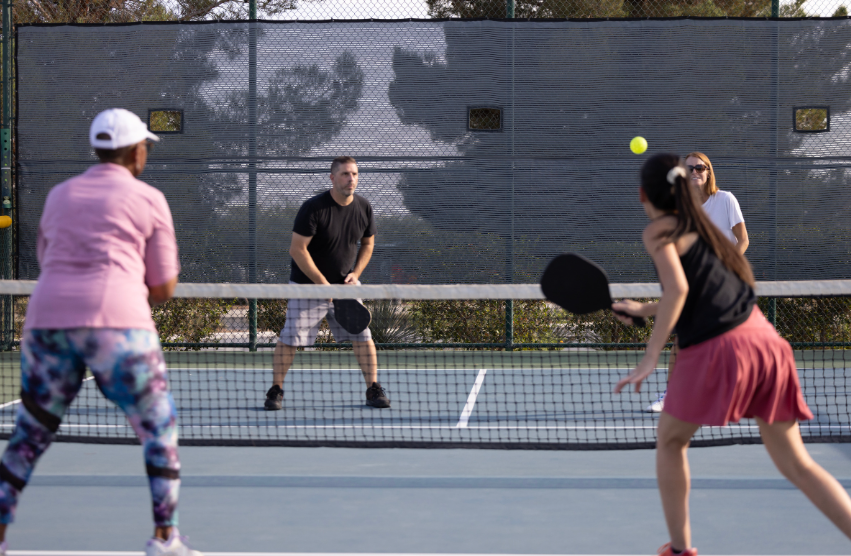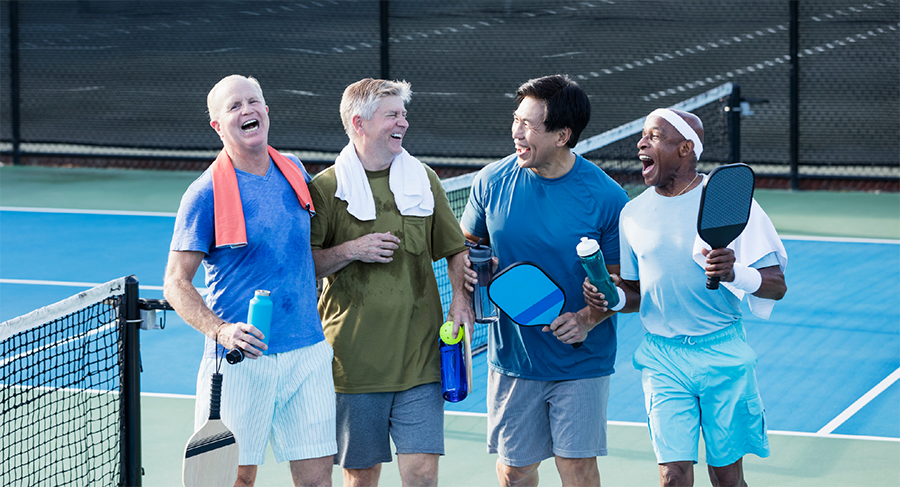Pickleball is a rapidly growing sport that’s not only fun for adults but also for kids. It combines elements of tennis, badminton, and table tennis, creating a game that’s relatively easy to learn and play. Here are several benefits of introducing kids to pickleball:
- Physical Fitness: Like any sport, pickleball provides a great cardiovascular workout. It improves heart health, agility, balance, and hand-eye coordination. It’s a fun way to keep kids active and help combat childhood obesity.
- Mental Health: Engaging in physical activities like pickleball helps reduce stress, anxiety, and depression. It promotes the release of endorphins, which are chemicals in the brain that act as natural mood lifters.
- Social Skills: Pickleball is a sociable sport often played in doubles format. This encourages teamwork, cooperation, and communication between partners. It can be a great way for kids to make new friends and strengthen existing friendships.
- Motor Skills Development: The game requires a mix of gross and fine motor skills, including running, hitting, aiming, and coordinating movements between the hands and eyes. Regular play can help enhance these skills in children.
- Learning Rules and Discipline: Understanding and following the rules of pickleball can help children learn about discipline and respect. It also teaches them about fair play and sportsmanship.
- Confidence Building: Mastering the skills needed for pickleball and seeing improvement over time can give kids a significant confidence boost. It shows them that they can achieve their goals with practice and persistence.
- Problem Solving and Strategic Thinking: Pickleball requires strategy to outmaneuver opponents. This can help develop problem-solving skills and strategic thinking in children, skills that can be beneficial in many aspects of life.
- Inclusivity: Pickleball is a game that children of varying skill levels and physical abilities can enjoy. It’s less physically demanding than some other sports, making it accessible and enjoyable for a wide range of kids.
- Family Time: Pickleball can be played and enjoyed by people of all ages. It provides a wonderful opportunity for families to spend quality time together, keeping everyone active and engaged.
- Fun: pickleball is fun! The joy of playing the game can help instill a lifelong love of physical activity and sport in children. This can set the stage for a healthy lifestyle that continues into adulthood.
- Flexibility: Playing pickleball requires a certain level of flexibility, and as children play more, their flexibility is likely to increase. This helps prevent injuries and improves overall bodily functions.
- Focus and Concentration: Pickleball is a fast-paced game that requires concentration and attention to detail. Kids have to keep their eye on the ball, predict where it’s going, and decide how best to hit it. These activities can significantly improve a child’s focus and concentration over time.
- Sense of Belonging: As a team sport, pickleball can provide a strong sense of belonging and community. Being part of a team can give children a sense of identity and the comfort of feeling included.
- Resilience and Handling Pressure: Playing games also means experiencing wins and losses. Dealing with the disappointment of a loss can teach children resilience, and learning to handle the pressure of game situations can help develop their ability to stay calm under stress.
- Instills a Sense of Achievement: As children improve their skills and win matches, they experience a sense of accomplishment. This can be a powerful motivator in other areas of life, encouraging the pursuit of goals and the willingness to work hard to achieve them.
- Spatial Awareness: Playing pickleball helps to develop a child’s spatial awareness, as they need to understand the court’s layout, keep track of their opponent’s position, and know where they’re hitting the ball.
- Improved Sleep: Regular physical activity like pickleball can help improve children’s sleep patterns. Good sleep is critical for a child’s growth, learning, mood, and overall health.
- Opportunity to Compete: For kids who are naturally competitive, pickleball provides a healthy outlet for this trait. It offers the chance to compete in a structured, respectful environment, and can even lead to opportunities for competition at higher levels as they get older.
- Teaches Patience: Pickleball is a game of strategy as much as it is about physical prowess. Players must wait for the right opportunity to strike, teaching kids the virtue of patience.
- Lifelong Skill: Once learned, pickleball is a skill that kids can carry with them throughout their lives. It’s a game that can be played at all ages, providing opportunities for enjoyment, competition, and exercise far into the future.
- Non-contact Sport: Unlike some other sports, pickleball is non-contact, which can be safer for children. This reduces the risk of injury from collisions or aggressive play.
- Easy to Learn: Pickleball has simple rules and requires minimal equipment, making it an easy sport for children to pick up. This is particularly beneficial for younger children or those who are new to sports.
- Enhanced Reaction Time: The speed of the game aids in the development of quick reflexes and reaction times. This is a skill that can benefit kids in various sports and everyday life.
- Creativity: Despite its straightforward rules, pickleball allows for a great deal of creativity in terms of strategy and shot selection. This can help kids think creatively and adapt to different situations, both on and off the court.
- Teaches Responsibility: Children have to take care of their equipment, follow the rules, and respect the officials and other players. This helps teach responsibility and respect.
- Coping Skills: It’s natural in any game to have moments of frustration. Learning to handle these emotions productively is a valuable skill. Kids learn to focus on what they can control and let go of what they can’t, like a bad call or a lucky shot by an opponent.
- Time Management: If children are involved in competitive or regular play, they will have to balance their time between pickleball, school, family, and other activities. This can help develop good time management skills.
- Healthy Competition: While the sport fosters camaraderie and teamwork, it also cultivates a healthy sense of competition. This teaches children how to deal with competition in other aspects of life.
- Promotes Independence: Pickleball can foster a sense of independence as kids learn to rely on their skills and judgment during the game. They make decisions on their own, like choosing where to serve or how to position themselves.
- Outdoor Activity: If played outdoors, pickleball gets children out in the fresh air and sunshine, which can be great for their overall health. It helps them disconnect from screens and technology, promoting a love for outdoor activities.






